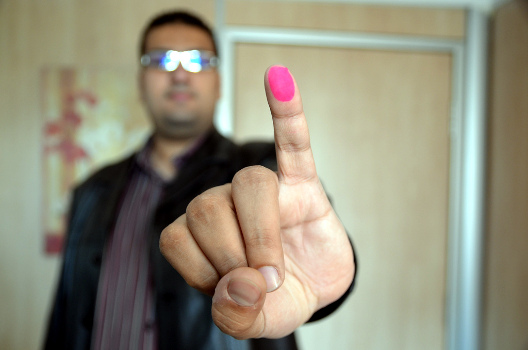 Millions of Egyptians voted this week on a new constitution, a referendum that may help decide whether the country of 80 million people – for centuries a fulcrum of the Arab world – might return soon to a semblance of political stability. Several parties boycotted the poll, the first nationwide vote of any kind since the military and street protesters ousted President Mohamed Morsi last year. The vote opened three years to the day after the regional upheaval called the Arab Spring toppled its first autocratic regime, in Tunisia. Since then, Egypt, Libya and Yemen have ousted autocratic leaders, but all four Arab nations have struggled to achieve either political stability or a clear path to democratic governance.
Millions of Egyptians voted this week on a new constitution, a referendum that may help decide whether the country of 80 million people – for centuries a fulcrum of the Arab world – might return soon to a semblance of political stability. Several parties boycotted the poll, the first nationwide vote of any kind since the military and street protesters ousted President Mohamed Morsi last year. The vote opened three years to the day after the regional upheaval called the Arab Spring toppled its first autocratic regime, in Tunisia. Since then, Egypt, Libya and Yemen have ousted autocratic leaders, but all four Arab nations have struggled to achieve either political stability or a clear path to democratic governance.
The Atlantic Council’s EgyptSource blog followed the referendum with updates. Also, EgyptSource’s editor, Nancy Messieh, has compiled a page of resources that help explain the vote and its implications. And to better track the history of these turbulent three-plus years, the Rafik Hariri Center for the Middle East has assembled a timeline charting the progress of the political transitions in Egypt, Tunisia, Libya and Yemen.
How Egypt got here – and what it may mean
In January and February 2011, Egyptians jammed Cairo’s streets, protesting corruption, unemployment and political repression by the 30-year-old, military-backed government of President Hosni Mubarak. The protests forced Mubarak’s resignation in favor of a military-backed interim government. In 2012, Egypt held its first democratic presidential election, giving a narrow victory to Mohamed Morsi, an engineering professor and leader of the Muslim Brotherhood. Morsi claimed sweeping presidential powers and sponsored the drafting of a new constitution, actions that many more secular Egyptians protested as an Islamist attempt to hijack a democratic revolution.
Amid massive street protests against Morsi in June, the military declared his ouster and arrested him. The military’s leader, Gen. Abdul Fattah al-Sisi, has since dominated a government that itself has faced strong public protest as it has banned and suppressed the Muslim Brotherhood and drafted its own constitution.
The lopsided, 98 percent ‘yes’ vote, combined with the low turnout seems unlikely to give the military-backed government the truly broad mandate of support that it sought from the poll. The exercise also remains overshadowed by Egypt’s continued political division, notably the government’s plan to put Morsi on trial next month for allegedly inciting the killing of street protesters while he was in office.
Opponents of the current government say the proposed constitution, drafted by an appointed committee, would be a flawed vehicle for democratic governance. And the referendum itself is deeply flawed, according to many Egyptians, including Mohamed El-Dahshan, a Harvard University research fellow. Officials obstructed or arrested people who tried to campaign for a ‘no’ vote, and the repression led Egyptians to joke that the ballot would contain only an option to vote ‘yes.’ El-Dahshan writes from Cairo that “it is clear that the state has all but given up any pretenses of a democratic process.”
Still, Tamer Nagy Mahmoud, an Egyptian lawyer in Washington and member of the Public International Law & Policy Group, says the draft constitution’s text is a glass half full. While the charter will let Egypt’s powerful military continue to dominate civilian political forces, it also guarantees gender equality, bans torture and human trafficking, and takes other steps useful to gradually building a more democratic political system. That process will require years of small steps, Mahmoud says, and despite the charter’s flaws, “the progress made in this proposed constitutions is one such step forward.” With its formal passage, the greater test will be whether Egypt’s state institutions will show the political will to defend the human rights written into this constitution — including whether the Supreme Constitutional Court will assert its independence, notably from the military-dominated political establishment.
